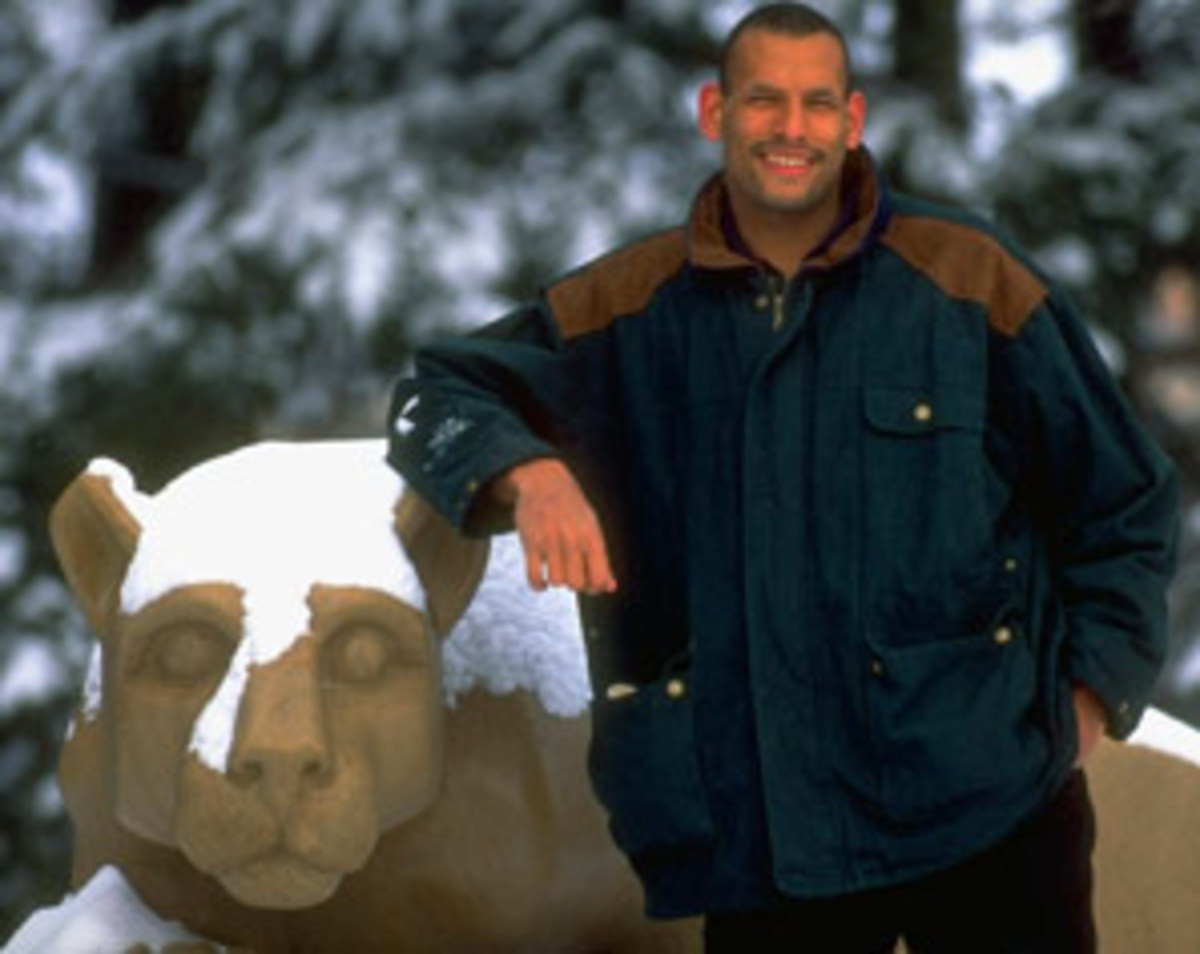Penn State alum John Amaechi wants to help school heal
On the other side of the Atlantic, 3,500 miles from State College, Pa., a very tall Penn State alum tries to make some sense of this contemporary Greek tragedy. Like so many, his emotions whipsaw. He is devastated for the alleged victims. He is disappointed by how his school handled this from the outset -- whenever that may have been.
Based in Manchester, England, former NBA player John Amaechi is a speaker, author, commentator and activist. But he works primarily as an organizational psychologist. "I work to help organizations that have a dysfunctional culture or climate, to help organizations with unhealthy focuses and help get them refocused," he says. So, yes, he says, he would love to be involved with Penn State. He's reached out to Penn State administrators several times, offering his services. He still awaits a response.
Amaechi graduated from Penn State in 1995. He was the star center on the basketball team and an Academic All-America and he wants to stress this point first: He loves his school. He is not another "Penn Stater Hater," the new phrase in heavy rotation on various message boards. "I will never forget or regret going to Penn State," he says. "I have great affinity for a place that helped me become who I am. The lessons I learned, the professors I got to learn from -- it was remarkable."
A native of England and a transfer from Vanderbilt, Amaechi arrived on campus in the early 90s. Then, as now, he was struck by the insularity of the football program. "It was clear that there were sports," he says, "and then there was football." He lived on-campus with all sort of students including athletes in other sports. Except for football players. "They lived apart," he says, "and we didn't get to see them in the regular course of things."
Bright, curious, and outgoing, Amaechi would appear to be precisely the type of student-athlete to find favor with Joe Paterno, the Ivy League English major, the public intellectual given to speaking high-mindedly of Penn State's "Grand Experiment," melding athletics and academics. Amaechi says it wasn't until he became an All-Big Ten player that he got an audience with his school's iconic football coach. "He asked me to come to some football games and then talk to some football recruits," he says, "So, I got to meet him that way."
When Paterno was fired last week, Amaechi was not, as he puts it, "cut up." Some of this was visceral; some of this was Amaechi thinking like an organizational psychologist, likening the situation to the BP oil executive whose company is responsible for a spill in the Gulf, or the CEO of UBS after the recent rogue-trading incident. "The head has to go," he says. "It's the only way forward."
While at Penn State, Amaechi had some interactions with Jerry Sandusky. Sandusky recruited Amaechi to volunteer for Second Mile, the foundation for at-risk kid Sandusky had founded in 1977 and now, of course, figures prominently in this scandal. "It was myself and my cohorts -- a couple of wrestlers, volleyball players from the men's and women's side, runners. We would go down and do whatever [the kids] were doing, whether it was play days or sports activities," Amaechi recalls. "It's part of what makes this painful. I had no personal relationship [with Sandusky], but it almost feels like the athletes involved were what made Second Mile so alluring to the kids."
After graduation, Amaechi played overseas and in the NBA from 1995 to 2003. All the while, he continued studying psychology. He's been back to campus to speak. He has worked professionally with Penn State staff, one of the many corporate clients he has advised. How would he begin to address the current "corporate culture" at his alma mater?
"Clearly, the football program has an unhealthy power relationship with the rest of the university," he says. "They are outside the umbrella of control, in a very overt way ... I am constantly railing about the complete lack of perspective when it comes to sport ..... is what can happen when people aren't as important as the temporary propping up of the athletic program.
"The other part: central Pennsylvania is not exactly a mecca for people outside the university. It seems to me that the oversight was less than it should have been, by people who have been pushed way outside the reach and power of Penn State. We're talking district attorneys, state attorneys, governors. I don't expect campus security to be the ones to take this to the top."
Amaechi has plenty more thoughts and he's willing to travel great distances to share them. "I have e-mails out because I want to help," he says. "What can I say? I hope they'll be back in touch."






